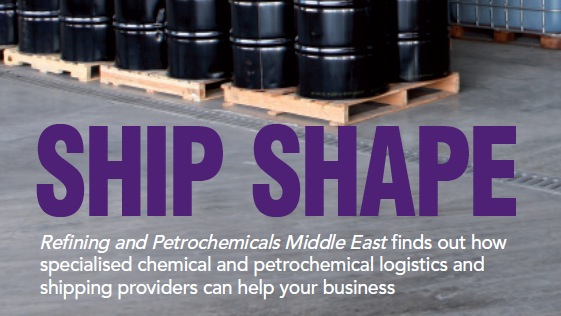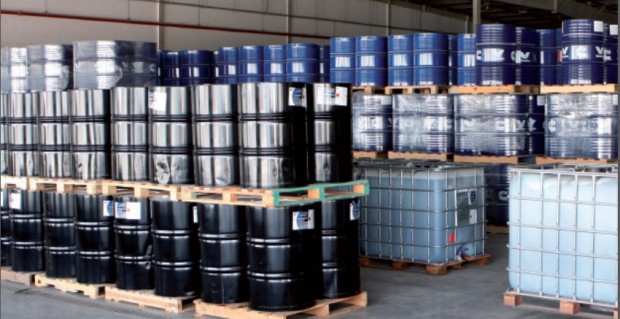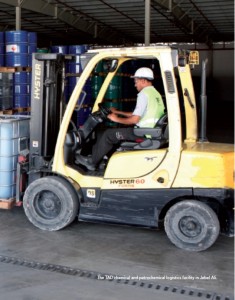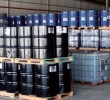SHIP SHAPE: TAD CEO Khalid Albawardi Cited in Refining and Petrochemicals Middle East

As the majority of regional petrochemical producers are clustered in the GCC group of nations and typically based on the Arab peninsula, sophisticated and reliable logistics and shipping operations are absolutely vital to success in supply as the majority of clients are based in the Far East.
For petrochemicals producers, logistics is the second most important aspect of the business after feedstock price. “Within the logistics aspect, the cost and the service quality are the most important factors,” explains Peter Richards, director and GM of Gulftainer. The company currently provides logistics services to several petrochemical companies, including SABIC. “We serve major petrochemicals companies with logistics services, as it is very important for them to keep the competitiveness of their product,” says Richards.
The main means by which petrochemical products are transported in the Middle East is by ship, with some limited use of land transportation. “At Borouge, the vessels we use for transporting our products mainly polyethylene (PE) and polypropylene ( PP), as well as solid products in bags or bulk from our petrochemical plant in Ruwais to the UAE ports (Mina Zayed and Jebel Ali) are feeder ships of 1100 TEU capacity,” says Hafed Ali Hamshari, supply chain workstream leader at Borouge 3. “We use the main shipping lines to deliver our products from the UAE ports to customers all over the world, as well as supply to our three logistics hubs in Singapore and China. We also ship liquid Ethylene from our plant in Ruwais to selected customers. The ships used are of 4500 – 9000 tonne capacity,” he explains.
To ship these products, petrochemical producers should provide shipping lines operators with key information related to the cargo. “The information required by the shipping liners before accepting the chemical products includes type of class, UN no., packaging type, and, the Material Safety Data sheet (MSDS) which could be required for analyzing further,” says Khalid Al-Bawardi, managing director at TAD logistics.
 This information is important for shipping liners for the proper handling of the end product, mainly for safety. “While handling chemical cargo the staff should wear glasses, gloves and a mask. If any chemical items are to be disposed, the process should be done under the consent of a local authority,” says Al-Bawardi.
This information is important for shipping liners for the proper handling of the end product, mainly for safety. “While handling chemical cargo the staff should wear glasses, gloves and a mask. If any chemical items are to be disposed, the process should be done under the consent of a local authority,” says Al-Bawardi.
The safety issue is also a key factor for all parties involved in handling petrochemical products. “We are a certified company in ISO-9001 and ISO-14001 in all the production, sales and marketing locations,” says Hamshari.
“We have well-structured sustainability (including Health, Safety and Environment) and quality policies and procedures, and we are currently a signatory of chemical industries’ “Responsible Care” global charter. In other words, safety is our number one priority in our business,” Hamshari explains.
Parties involved in handling chemical and petrochemical products face many challenges, which vary from party to another. From a producer’s point of view, the lack of prominent companies in the GCC which provide land transport is a challenge. “There are no available recognized and professional transport companies that can operate between the GCC and other neighboring Arab Countries (Syria, Jordan and Lebanon),” explains Hamshari.
Difference in legislation between countries in the region is a further challenge. “The governing legislations are still evolving and there are large differences in accepted specifications for roads, trucks, signage and load limits,” notes Hamshari. “But, there is an on-going effort by the GPCA along with others aiming to establish common ground to improve the industry,” he says.“Structured coordination between ports also needs to be improved and is vital.”

In addition, logistics providers face challenges related to warehousing. “Receiving the necessary approval for warehouse is a complicated and time consuming process as it
also requires customs inspections,” says Al-Bawardi. Due to the risks associated to handling these products, staff dealing with petrochemical products should have a background in managing these products. “That is why at TAD Logistics we have designed a special warehouse to store chemicals at Jebel Ali free zone, and we hired specialized people to run that facility,” Al-Bawardi notes.
Cross-border logistics operations in the Gulf depend mainly on Saudi Arabia, as it has borders with all the GCC members. “The cross border logistics operations are governed by h
ow KSA approaches this issue at any time, since it has borders with all the GCC countries, and most of the cross border traffic between GCC countries passes KSA as transit all the time. As always there is room for more streamlining,” says Hamshari.
“Customs documentation needs to be simplified, in order to transport the cargo without any delay,” notes Al-Bawardi.
The current market situation is supporting Gulf producers’ export of solid products in containers to the main Asia markets, which are the main and expanding target markets, say experts. “This is due to the fact that empty containers are available here in the Gulf ports, and shipping lines need to reposition them to Asia. To facilitate that, they offer attractive rates to the exporters from the Gulf region,” says Hamshari. “The future situation is expected to change from 2018 or later, where the availability of empty containers is expected to drop, and a repositioning cost might need to be paid by the exporters to source the containers,” he concludes.


